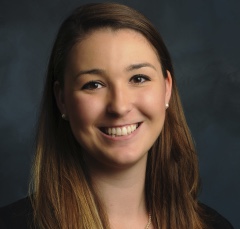Rachel Brunson, Learning Center Assistant Director
Rachel graduated from USF’s School of Education with a Master of Arts in Organization & Leadership (emphasis in Higher Education & Student Affairs) in 2013, after receiving her Bachelors degree in English from Notre Dame de Namur University in 2011. She is originally from Angels Camp, CA, a small town in the foothills of the Sierra Nevada mountains. Rachel is passionate about enriching student success and impacting student persistence through collaborative learning and peer leadership; she is grateful to work in the Learning & Writing Center, which cultivates individualized learning environments for USF students. Outside of work, Rachel enjoys reading, writing, knitting, hiking, playing the piano, watching basketball, and traveling with family and friends.
When I was in graduate school I took a course called “Sociocultural Foundations of
Organization and Policy,” which introduced me to hermeneutics, the theory and methodology of
interpretation. I wrote my final paper on Theodor “Ted” Seuss Geisel, who you may recognize if
I call him by his pen name, Dr. Seuss. At first glance the topic of this paper may seem trivial, but
studying his life and works with a Hermeneutic lens was as fascinating as it was insightful. All
fancy language aside, what I took away from this course is that learning is an ever-evolving
process and new knowledge is understood through our imaginations and our experiences.
Essentially, we do not learn new things in isolation from other things. As a mentor of mine
defines it, learning is “the manipulation of what you already know to make new
information meaningful.”
Sometimes talent surfaces in the most unexpected candidates. Sometimes those who are
believed in the least turn out to be the biggest surprise. Such is the case of “Dr. Seuss,” the boy
who lacked any ounce of ambition but who became one of the most well-known and imaginative
children’s story authors of all time. In high school Ted sharpened his skill of making things
awkward, misshapen, and bizarre, and his classmates voted him Class Artist and Class Wit.
During his junior year at Dartmouth College, Ted worked for the humor magazine and
discovered the “excitement of marrying words to pictures” (Fensch 2000:39). He also
determined that writing and editing a college newspaper or magazine seemed to be a better
education than attending his college classes. He approached graduation with no career in sight,
no job on the horizon, no plans, and with no real ambition to do anything. He was even voted
“least likely to succeed” (Fensch 2000:41). He then went to Oxford University in England, but
eventually dropped out and moved back to the US with no job, no prospects for a job, and
supposedly no talent for a job, either.
Dr. Seuss’s historical background plays a crucial role in understanding him—it was through his
artwork that he created a world with no rules, the sense of freedom he’d longed for since he was
a young child staring out of his bedroom window. Reading his texts through the prism of his
real-life experiences and attitudes reveals that true understanding is reached through one’s
imaginative abilities. Kearney (1998:149) says, “The symbolizing power of
imagination…transforms given meanings into new ones, [and] enables one to construe the
future as the ‘possible theatre of my liberty,’ as a horizon of hope.” The most obvious connection
with Dr. Seuss and Hermeneutics is the power of imagination.
Life can be seen as a great balancing act, whether that be due to different horizons fusing
together, a sense of identity loss or uncertainty, or other factors. The past and future are
negotiated in terms of the present, and this is all a by-product of imagination. Ironically enough,
one of Dr. Seuss’s most famous and widely gifted books, “Oh, the Places You’ll Go!” is based
on a cynical phrase that he picked up during a time when he was just beginning to explore his
imaginative abilities: right as he was leaving for college.
As you continue your journey, I invite you to reflect on these questions, as I try to do
periodically…
Do you rely on past knowledge and/or experiences as you work to create new understanding?
Do you allow yourself space to learn from “mistakes” or situations that did not go as planned?
Do you imagine a successful future, or focus mainly on the tasks (or the stresses) of the
present?
How can you sustain a “horizon of hope” and what reminders do you need in the ever-evolving
process of learning?
What resources can you use to enable you to make meaning of new knowledge?
If you are a student at the University of San Francisco, do not hesitate to visit The Learning
Center for resources or assistance! We aim to support students in redefining themselves as
learners, enhancing their current skills and talents, developing new skills and strategies, setting
concrete goals and make effective decisions, holding themselves accountable and practicing
self-regulation, challenging themselves to be their best. We sit down 1:1 with students for
Academic Skills Coaching appointments to help you get started and stay on track! Come see
us!
References:
-Kearney, Richard. Poetics of Imagining: Modern to Post-Modern. Fordham University Press, New York, 1998.
-Fensch, Thomas. The Man Who Was Dr. Seuss. New Century Books, Texas, 2000.
